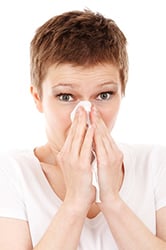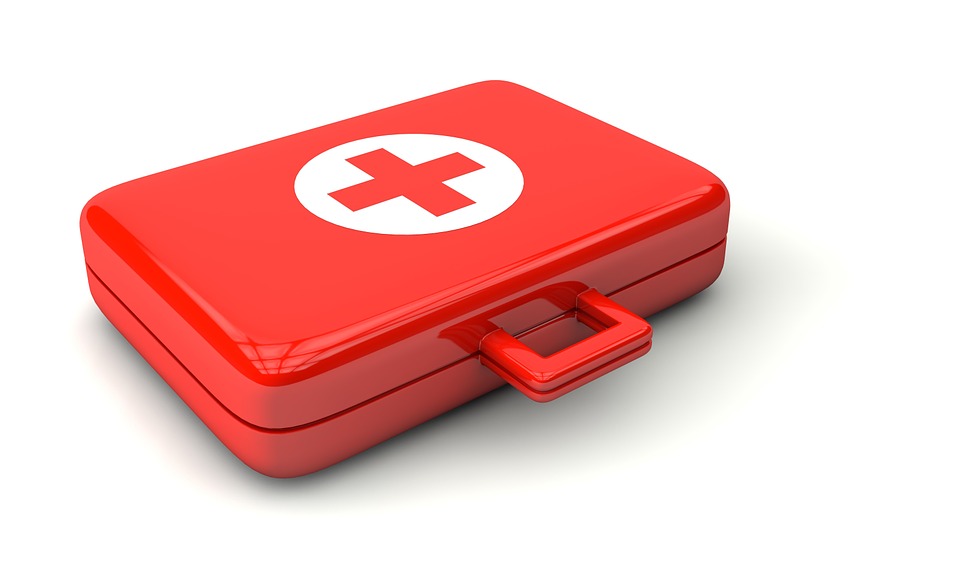Numerous environmental conditions at your workplace and/or home can cause you to suffer an allergic reaction that ranges from mild to life-threatening. Consider these tips as you reduce allergens and protect yourself.
Common Allergens
Depending on your job and workplace, you may be exposed to numerous allergens as you work. Consider this partial list.
- Latex gloves or equipment
- Ink toner
- Cleaning chemicals
- Floor wax
- Perfume
- Cigarette smoke
- Dust
- Food, including nuts and dairy
- Mold
- Asbestos
- Aerosols
- Paint fumes
- Dye
- Pollen
- Pet dander
Possible Allergic Reactions
The allergic reaction you experience can be mildly annoying or severe and life threatening. Be aware of these possible reactions.
- Contact dermatitis
- Sneezing
- Pain
- Swelling around your mouth or elsewhere
- Hives
- Itching
- Trouble breathing
- Anaphylactic shock
What to do if you Have an Allergic Reaction
Seek medical treatment as soon as you suspect you’re having an allergic reaction. To provide the best possible treatment, your doctor or emergency medical personnel may ask for a list of possible allergens to which you may have been exposed.
How to Prevent Allergic Reactions
While you can’t always prevent allergen exposure, you can advocate for an allergen-free work environment. Ask about switching to natural cleaning supplies or banning peanut butter as you remove allergens that affect you and your co-workers.
You may also take protective measures. Wear gloves, use a respirator or open a window as you reduce exposure to your known allergens.
Request special accommodations, too, especially if you have a known allergy. According to the Americans With Disabilities Act (ADA), you’re considered disabled if your allergy limits your activity level. In this case, you can request that your employer improve ventilation throughout the building or allow you to work a different shift when allergen use is limited.
What Does Workers’ Compensation Cover?
By law, your employer must provide a safe work environment. If you suffer an allergic reaction to chemicals, cleaning supplies or something else and can’t perform your job, you may be eligible to file a Workers’ Compensation claim.
Workers’ Compensation benefits could cover your medical treatment, a portion of your lost wages and other expenses. However, you must prove that the allergic reaction stemmed from something at work and not food, medication or another environmental condition you encounter at home or elsewhere.
If working conditions or environmental factors cause you to suffer an allergic reaction, you can file a Workers’ Compensation claim. Discuss your specific case with your Human Resources manager and doctor as you protect yourself at work.
Read more
 Thanks to your health insurance policy, you can receive routine checkups, specialist consultations, lifesaving medications and necessary procedures for just a few dollars a month. Your premiums may be rising this year, though, because of increased health insurance policy costs and decreases in your employer’s budget. Instead of dropping your coverage or paying a fortune for health insurance, stay healthy and balance your personal budget in the new year with six tips.
Thanks to your health insurance policy, you can receive routine checkups, specialist consultations, lifesaving medications and necessary procedures for just a few dollars a month. Your premiums may be rising this year, though, because of increased health insurance policy costs and decreases in your employer’s budget. Instead of dropping your coverage or paying a fortune for health insurance, stay healthy and balance your personal budget in the new year with six tips.
1. Review Your Benefits
Does your current health insurance policy include vision, dental or prescription medicine coverage that you rarely use? Dropping these options could reduce your health insurance costs.
2. Shop for Private or Government Exchange Health Insurance
Instead of automatically accepting your employer’s coverage with higher monthly premiums or fewer benefits, shop around. Private or state sponsored health insurance could be a more affordable option for you.
3. Increase Out-of-Pocket Expenses
Put your good health to good use and elect to pay lower monthly premiums in favor of higher out-of-pocket expenses. Yes, your deductible and copays will increase, but you could save money in the long run.
4. Consider Joining Your Spouse’s Policy
If your spouse or partner has employer-sponsored health insurance, discuss the costs of joining his or her policy. You could save money by switching to family coverage instead of carrying individual policies.
You should also check out your options after qualifying events occur in your life. In those cases, you may be able to switch your health insurance coverage and save money. Those events include:
- Marriage
- Child Birth or Adoption
- Legal Separation or Divorce
- Death of Spouse or a Dependent
5. Rethink Insurance Options When You’re Laid Off
January is a typical month for downsizing. If you lose your job, you could be eligible for Cobra (Consolidated Omnibus Budget Reconciliation Act). You continue to pay your health insurance premiums plus a two percent administrative fee, and your insurance does not lapse.
The costs of COBRA can be expensive, though, especially when you aren’t receiving a paycheck. You have 60 days to decide if you want your COBRA benefits or not, so start researching private options as you make the best financial decision for you.
6. Get and Stay Healthy
Little things like exercising regularly, eating a balanced diet and quitting smoking can reduce your health care costs since you’ll see the doctor less often. Additionally, your employer may offer wellness incentives for healthy living that can reduce your premium costs. Even if they aren’t offered, you will save money when you get and stay healthy.
This January, take time to review your health insurance. With these six tips, you can save money, be healthy and stay on budget in the new year.
Read more
 Get a good night’s sleep, and you’re more likely to wake up alert, energetic, happy and able to function. Since November is National Sleep Comfort Month, implement six tips that help you sleep better and more comfortably.
Get a good night’s sleep, and you’re more likely to wake up alert, energetic, happy and able to function. Since November is National Sleep Comfort Month, implement six tips that help you sleep better and more comfortably.
1. Invest in a Quality Mattress and Comfortable Bedding
Your sleep comfort depends largely on your mattress. If it’s lumpy, hard or scratchy, you’ll toss and turn instead of truly resting. Visit a local mattress store today and invest in the best mattress and bedding you can afford. It will quickly pay for itself as you sleep better and enjoy greater productivity and happiness.
2. Lower the Temperature
Because your body heat rises slightly as you sleep, you’ll be more comfortable when you lower your bedroom temperature by a few degrees. Opening a window or turning on a fan produces the same results.
3. Limit Big Evening Meals
Visiting the buffet for dinner tasted good at the time, but a large evening meal increases overnight discomfort. It will keep you awake and give you indigestion and heartburn. Step away from the kitchen at least two hours before bed. If you need a snack, indulge in a small portion of cereal with milk, fruit or granola.
4. Skip Alcohol and Caffeine
Your late-afternoon coffee affects your sleep 10 to 12 hours after you drink it. Your nightcap might make you drowsy, but the alcohol will wake you in the middle of the night. To boost your afternoon energy level, grab an apple, walnuts or cheese. If you want an alcoholic drink at night, enjoy it at least two hours before bedtime.
5. Relax
When you’re anxious, tense or stressed, your body won’t be able to relax. Practice yoga, deep breathing and visualization. As you relax your mind, your body will follow, and you’ll enjoy more comfortable sleep.
6. See Your Doctor
If you still can’t get comfortable at night, talk to your doctor. Discuss physical or mental issues that might be preventing you from getting adequate rest. Check with your insurance agent, too, about whether chiropractor visits or specialty pillows are covered by your insurance.
With a good night’s sleep, you wake up in a good mood and ready to tackle the day.
Read more
 You already cook meat on the grill. Why not add fruits and veggies? They help you boost your summer nutrition and taste delicious.
You already cook meat on the grill. Why not add fruits and veggies? They help you boost your summer nutrition and taste delicious.
Choose Fresh Produce
Whether you decide to grill pineapple, watermelon, corn or asparagus, make sure it’s fresh. Ideally, the produce you grill should be firm and picked within the past three days.
Brush on the Oil
You’ll want to stock quality canola, olive or coconut oil in your pantry before you grill produce. It adds extra flavor to your grilled produce and a light coating works together with foil packets or a non-stick grate to ensure the fruits and veggies don’t stick to the grill.
Mix a Few Marinades
In addition to the oil, prepare a few marinades. Olive oil infused with herbs, raspberries, mint or other flavorings, honey and low-fat or Greek yogurt enhance the taste of your grilled produce.
Leave the Skin On
The skin of many fruits and veggies contains healthy nutrients. So, leave veggie skins on when you grill them and maximize the nutrient content of the grilled veggies you eat. Most fruits, however, grill better without the skin.
Pre-Cook Some Veggies
Certain veggies cook more evenly on the grill when you pre-cook them in the kitchen. To prep asparagus, beets, broccoli, parsnips, potatoes, squash and carrots for grilling, steam or blanch them until they’re al dente. Alternatively, tomatoes, sweet potatoes, peppers, mushrooms, onions and eggplant will cook evenly when you grill them raw.
Use the Right Temperature
When you cook fruits and veggies over moderately hot coals, the outside could cook faster than the inside. You’ll want to rotate the produce between direct and indirect heat so that each piece cooks evenly and completely.
Whether you cook for one or 100, prepare fruits and veggies on the grill and enjoy a summer nutrition boost. They help you stay healthy, and you’ll feel good knowing that you’re helping your family and friends stay healthy, too.
Read more
 COVID-19 has changed the way we are going to remember this Independence day weekend. Governor Newsom has announced stricter restrictions and closures ahead of the July 4th weekend, including a crackdown on mask wearing violations. Public fireworks have been cancelled in most counties.
COVID-19 has changed the way we are going to remember this Independence day weekend. Governor Newsom has announced stricter restrictions and closures ahead of the July 4th weekend, including a crackdown on mask wearing violations. Public fireworks have been cancelled in most counties.
However, it is a big holiday weekend and Americans will celebrate, here are some safety tips.
Take Precautions While Grilling
Burgers, hot dogs, fruit and pizza taste delicious when they’re grilled. Grab your favorite side dishes and follow a few precautions that ensure you and your guests grill safely.
- – Always supervise the grill when it’s in use.
- – Never grill indoors or in a fully enclosed area such as a garage or tent.
- – Use lighter fluid sparingly and never after the coals are ignited.
- – Keep children and pets away from the hot grill.
- – Remove flammable objects, including trees, from near the grill.
- – Use long-handled tools to handle food.
Use Fireworks Safely (if allowed)
Public fireworks displays are the safest way to enjoy the beautiful colors and terrific booms of this July 4th tradition, especially when you maintain a distance of at least 500 feet between you and the show. Firework displays at home can be fun though too. If you go that route, take these precautions.
- Follow the instructions on the packaging.
- Never allow children to play with the fireworks.
- Stock a fire extinguisher or water supply nearby.
- Wear eye protection when lighting fireworks.
- Remove flammable materials from the area.
- Never point fireworks toward people, animals, vehicles or structures.
- Properly dispose of duds rather than trying to relight them.
Stay Safe on the Beach (if allowed in your area)
Swimming is a fun summer activity, and it’s good exercise. At the beach, lake, public pool or backyard pool, stay safe with these tips.
- – Swim only in designated areas.
- – Obey the lifeguard and all posted signs.
- – Swim sober.
- – Get out of the water during a storm or if you hear thunder or see lightening.
- – Require children to wear life jackets.
- – Don’t dive into shallow water.
Wear Sun Bathing Protection
Picnics are part of many July 4th celebrations. You should also take these protective measures.
-
- – Wear sunscreen that’s at least 15 SPF.
- – Remember to apply sunscreen to your ears, hair part and the tops of your feet.
- – Avoid direct sunlight between 10 a.m. and 4 p.m. when the UV rays are strongest.
- – Reapply sunscreen every two to three hours or more frequently if you’re sweating.
- – Drink plenty of water even if you’re not thirsty.
- – Wear a hat, sunglasses and long sleeves if you have to be in direct sunlight.
- – Watch for signs of heat stroke, including hot, red skin, shallow breathing and rapid, weak pulse.
Please be safe out there, follow the rules and guidelines and have fun.
Read more
 What do you most appreciate about being a dad? With Father’s Day approaching on June 15, there’s no better time than today to protect your health. Learn about the top health risks men face and ways to combat these risks so that you can enjoy many more years with your children.
What do you most appreciate about being a dad? With Father’s Day approaching on June 15, there’s no better time than today to protect your health. Learn about the top health risks men face and ways to combat these risks so that you can enjoy many more years with your children.
1. Heart Disease
The top killer of men, heart disease, stroke and peripheral vascular disease are preventable. However, you will need to address the leading causes of heart disease. Do that when you stop smoking, lower your blood pressure, reduce your bad cholesterol levels and get your diabetes under control. An exercise regimen and healthy diet also help.
2. Lung Cancer
The top cancer among men is also the most preventable. Because smoking is the cause of 90 percent of lung cancer cases, talk with your health insurance company about available cessation programs and tools that assist you in getting healthy today.
3. Prostate Cancer
The second-leading cancer in men, prostate cancer can be prevented when men undergo an annual prostate-specific antigen (PSA) blood test and rectal exam. These tests should begin by age 50 or sooner if this cancer runs in your family or if you eat a high-fat diet.
4. Diabetes
If diabetes isn’t controlled, you could contract vascular disease, which leads to heart attacks, amputations, blindness, kidney failure and nerve damage. Medical treatment, a balanced diet, routine exercise and an active lifestyle can help you prevent or control diabetes.
5. Suicide
Four times as many men than women commit suicide. Men are also more likely than women to resist treatment for depression, frustration and other challenges. Asking for help is a sign of strength and can help you cope with life before you feel self-hated or a desire to commit suicide.
As a dad, focus on your health this Father’s Day. Schedule a physical exam with your primary care physician, and commit to living a healthier lifestyle. Your children will thank you.
Read more


 Thanks to your health insurance policy, you can receive routine checkups, specialist consultations, lifesaving medications and necessary procedures for just a few dollars a month. Your premiums may be rising this year, though, because of increased health insurance policy costs and decreases in your employer’s budget. Instead of dropping your coverage or paying a fortune for health insurance, stay healthy and balance your personal budget in the new year with six tips.
Thanks to your health insurance policy, you can receive routine checkups, specialist consultations, lifesaving medications and necessary procedures for just a few dollars a month. Your premiums may be rising this year, though, because of increased health insurance policy costs and decreases in your employer’s budget. Instead of dropping your coverage or paying a fortune for health insurance, stay healthy and balance your personal budget in the new year with six tips. Get a good night’s sleep, and you’re more likely to wake up alert, energetic, happy and able to function. Since November is National Sleep Comfort Month, implement six tips that help you sleep better and more comfortably.
Get a good night’s sleep, and you’re more likely to wake up alert, energetic, happy and able to function. Since November is National Sleep Comfort Month, implement six tips that help you sleep better and more comfortably. You already cook meat on the grill. Why not add fruits and veggies? They help you boost your summer nutrition and taste delicious.
You already cook meat on the grill. Why not add fruits and veggies? They help you boost your summer nutrition and taste delicious. COVID-19 has changed the way we are going to remember this Independence day weekend. Governor Newsom has announced stricter restrictions and closures ahead of the July 4th weekend, including a crackdown on mask wearing violations. Public fireworks have been cancelled in most counties.
COVID-19 has changed the way we are going to remember this Independence day weekend. Governor Newsom has announced stricter restrictions and closures ahead of the July 4th weekend, including a crackdown on mask wearing violations. Public fireworks have been cancelled in most counties. What do you most appreciate about being a dad? With Father’s Day approaching on June 15, there’s no better time than today to protect your health. Learn about the top health risks men face and ways to combat these risks so that you can enjoy many more years with your children.
What do you most appreciate about being a dad? With Father’s Day approaching on June 15, there’s no better time than today to protect your health. Learn about the top health risks men face and ways to combat these risks so that you can enjoy many more years with your children.